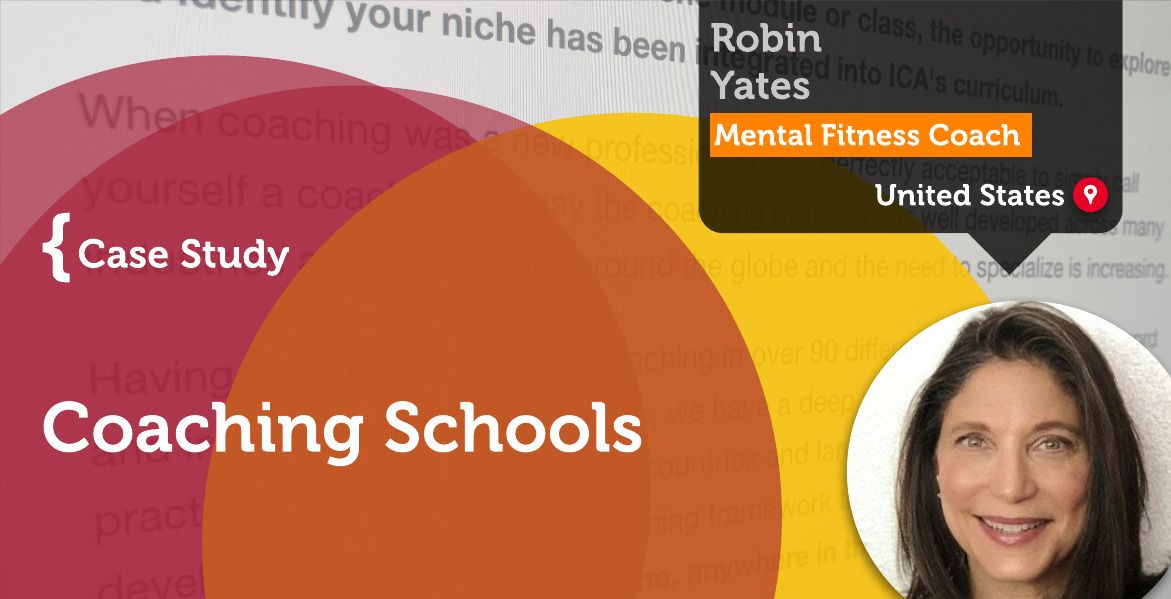A Coaching Case Study By Robin Yates, Mental Fitness Coach, UNITED STATES

Coaching Schools in Newark, New Jersey
Who knows how to learn better than teachers and school administrators? The short answer… no one. Does the question then become what could be getting in the way of implementing the lessons they just learned? In early 2021, I was hired to provide monthly capacity-building sessions for 25 schools in Newark, New Jersey. The Victoria Foundation was the generous sponsor of this consulting work which covered topics such as:
- Gauging Program Effectiveness
- Articulating Value
- Grant Research
- Increasing Odds of an Award
- Budgeting Best Practices
- Reporting and Stewardship
While attendance and feedback were extremely positive, the question remains, what changes did they make after acquiring or being reminded of all these tips and techniques? The good news is… the Victoria Foundation stepped in once again and provided funding for coaching to augment the consulting services previously provided. Coaching services are being offered to 15 of the 25 schools and are to be delivered to each school individually as they see fit. I was awarded the opportunity to work with five of these schools to provide eight hours of coaching each over the next five-to-six months.
Coaching Schools Core Problem and Challenges
The information previously provided was valuable to the schools, yet the daily grind and other priorities were a couple of reasons provided as to why the lessons did not take hold. As I move my practice from a consulting-based model to a coaching-based model, my challenge was to understand how coaching can help provide more sustainable change vs. consulting alone. Joe McCafferty from Tandem Solutions helped provide insights into how we learn and where coaching fits in (see Figure 1 below). If I can integrate the work on motivation from Carole Gaskell[1], for instance, and the innovation and activation models from Shirzad Chamine’sPositive Intelligence[2], this just might be the game-changer for sustained learning.

Where, originally, I imagined developing a coaching approach to appeal to all of the five schools I was awarded, I realized early on that each would need a more customized solution. One school wants me to coach one individual tasked with raising funds. The goal of our coaching sessions is to help her secure more large donors. Another school wants to include the Managing Director, a department head, and the President of an associated Foundation. All are to receive a recap of our capacity-building sessions to take each topic further for them as a team…a blended coaching approach.
Anticipated Coaching Skills in Coaching Schools
As I prepare to begin this work in January 2022, I am developing my approach for each school with an understanding that I need to meet the client where they are. To find out just where that is, I am conducting “Discovery” calls with each school to set the stage as to what coaching is vs. consulting and to have them begin thinking about the goal(s) for our work together. From there we will co-create our relationship with my initial intention being to remain focused on the following core competencies:
- Establishing the Coaching Agreement
- Creating Trust
- Powerful questions
- Creating Action
- Visualization and Anticipation
- Creating Structures
Coaching Schools Learnings
While we do not yet know the results of this work, I felt it important to write up this case study as it is a lesson learned in terms of how to scope and prepare for large coaching engagements. If I stay true to my values and principles about meeting people where they are and maintaining presence throughout to help them grow, then my initial hypothesis about preparing a “coaching curriculum” was severely flawed. I had bid on coaching 10 schools at once, and, in hindsight, am very glad that they only awarded me the opportunity to work with five schools.
In doing my work around Positive Intelligence, I know that I am prone to be highjacked by my “hyper-achiever” saboteur. In this instance, I was thinking that more is better. That this will help me get the coaching hours I need for ICF sooner vs. later. And yet now I ask myself, to what end? How will I give all five schools what they need? What can help me stay focused on them vs. on my achievements? What will I do if my “judge” saboteur takes center stage? How might I engage my “sage powers” to heighten my effectiveness for my clients?
Writing up this case study reminds me of the importance of preparation. This includes setting one’s own intention for an engagement, thinking through what might be valuable, and being prepared to pivot based on where the client may take you. Preparing effectively requires the same coaching competencies we practice externally with our clients to be used internally on ourselves. Now I am visualizing effective sessions, asking myself powerful questions, anticipating obstacles, and imagining ways to hold myself accountable. “Physician heal thyself” as the ancient proverb goes. In this instance, some self-coaching is just what the doctor ordered.
References
[1]Gaskell, Carole – Presentation at World Business Executive Coaching Summit “Motivation: The Secret Sauce in Thriving Team Dynamics”
[2]Chamine, Shirzad, “Positive Intelligence: Why Only 20% of Teams and Individuals Achieve Their True Potential and How You Can Achieve Yours”